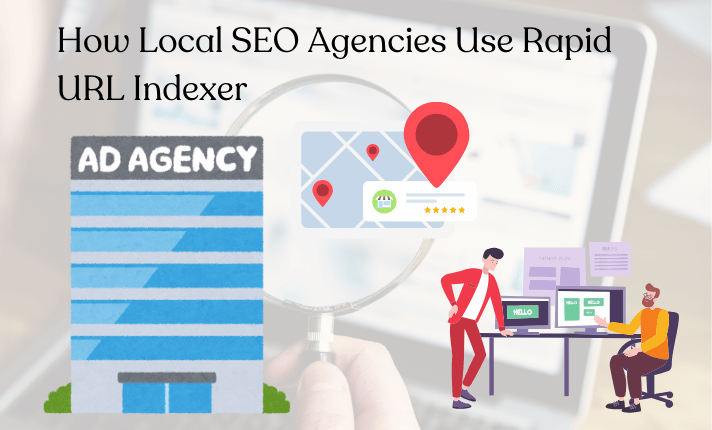Rapid URL indexers are becoming more and more popular but How Do Local SEO Agencies Use Rapid URL Indexer? Local SEO agencies rely on a variety of tools and techniques to get businesses ranked fast and accurately in search engines. One of the newer approaches is the Rapid URL Indexer, which ensures that web pages are quickly indexed by Google and other search engines. But how exactly does this work, and why are SEO agencies adopting this tool? This guide breaks down the strategies, benefits, and best practices for using rapid indexing to boost local SEO.
What is Rapid URL Indexing?
Rapid URL indexing is the process of accelerating how quickly search engines recognize and index new or updated pages. Instead of waiting for organic crawling (which can take days or weeks), rapid indexing ensures a faster listing in search results, giving businesses an advantage by improving visibility almost instantly.
Agencies often use tools that integrate with Google’s API, ensuring they stay compliant with search engine guidelines.
For more on international SEO applications, check out Can International SEO Efforts Be Enhanced with Rapid URL Indexer?.
Why Local SEO Agencies Use Rapid Indexing
Speeding Up Indexing
Rapid URL indexers reduce the time it takes for pages to appear in search results. This is crucial for campaigns that require fast visibility, like seasonal promotions or new product launches.
Targeted Indexing for Local Queries
These tools prioritize indexing for local search terms, ensuring that region-specific content appears in searches relevant to the business’s target area.
Automated Submissions to Multiple Search Engines
Rapid indexers automate the process by submitting URLs to several search engines and directories at once. This saves time and allows agencies to focus on improving other aspects of their campaigns.
Real-Time Performance Tracking
Some tools provide analytics that monitor how quickly pages are indexed and track their performance over time. Agencies can use this data to fine-tune their SEO strategies.
Rapid indexing reduces the time it takes for pages to show up in results, helping local businesses stay ahead. Still wondering if local seo is worth doing? check out our guide Is Local SEO Dead for more insights.

Comparison with Traditional Indexing Methods
While traditional indexing relies on manual submissions or natural crawling, rapid indexing tools automate and accelerate the process:
| Aspect | Traditional Indexing | Rapid URL Indexing |
|---|---|---|
| Time to Index | Days to weeks | Within hours |
| Manual Effort | High (requires individual submissions) | Minimal (automated submissions) |
| Use Case | Suitable for evergreen content | Best for time-sensitive content |
| Visibility Impact | Slower rankings | Immediate boost in visibility |
This comparison highlights the value of rapid indexers in time-sensitive campaigns and competitive markets where fast results are crucial.
How Rapid Indexing Fits into Local SEO Strategy
Local SEO relies on more than just keywords. It involves multiple factors like NAP (Name, Address, Phone) consistency, local backlinks, and Google Business Profile management. Rapid indexing complements these efforts by ensuring that search engines quickly recognize updates and new pages.
For example:
- Launching a new landing page for a restaurant’s holiday menu? Rapid indexing ensures it appears in searches immediately.
- Need to update your store’s opening hours? Rapid indexing ensures customers see the correct information right away.
How SEO Agencies Implement Rapid Indexing Safely
Choose the Right Tools
Tools like Google Search Console, IndexNow, and RankerX are widely used by agencies for rapid indexing. These tools help agencies align with best practices and ensure effective SEO results.
Integrate Indexers with Workflow Platforms
Integrating rapid indexers with WordPress or automation tools like Zapier ensures a smooth and streamlined process, reducing manual work.
Promote Content on Social Media
Sharing content on social platforms boosts initial traffic, signaling search engines that the content is valuable. This can further accelerate the indexing process.
Monitor Indexed Pages Regularly
Using Google Search Console, agencies can check the status of indexed pages and make adjustments if necessary, ensuring that every update or new page is visible.
Cost-Benefit Analysis of Rapid URL Indexers
While rapid URL indexers are cost-effective, it’s important to understand how their benefits translate into measurable outcomes.
Potential Benefits:
- Increased Website Traffic: Faster indexing can lead to higher traffic from search engines.
- Improved Search Rankings: Fresh content gets recognized sooner, boosting rankings.
- Higher Revenue: Faster visibility increases the chances of capturing time-sensitive sales opportunities.
Costs:
- Tool Subscription Fees: Depending on the platform, fees can vary.
- Monitoring and Optimization: Agencies need to allocate resources to track performance continuously.
By balancing these costs and benefits, agencies can determine whether rapid indexing aligns with their clients’ business goals.

Benefits of Rapid Indexing for Local SEO Campaigns
- Faster Visibility: Quick indexing ensures businesses appear in search results right when they need to, like during seasonal promotions.
- Improved SEO Performance: Rapid indexing allows fresh content to become searchable faster, boosting rankings.
- Enhanced Crawling Efficiency: These tools ensure search engines crawl websites more effectively, which improves the accuracy and speed of indexing.
Optimizing Content for Quick Indexing
Rapid indexing ensures your content is listed fast, but it must also meet search intent to rank well. SEO agencies optimize pages with:
- Local keywords relevant to the target audience (e.g., “best coffee shop in [city]”)
- Structured data markup to help search engines understand content better
- Internal links to related content, boosting overall site authority
Tracking Indexed Pages with Google Tools
SEO agencies monitor the effectiveness of rapid indexing using Google Search Console. This tool allows them to:
- Check which pages are indexed and identify those still pending
- Monitor region-specific traffic and performance
- Track changes in local keyword rankings
Analytics helps agencies fine-tune campaigns and maximize their impact.
Using Rapid Indexing for Local Promotions and Events
Imagine a local bakery launching a special promotion for Valentine’s Day. Using a rapid indexer:
- The landing page for the promotion is indexed within hours and appears in local search results.
- Social media posts drive immediate traffic, reinforcing the page’s value to search engines.
- The bakery experiences a 15% increase in store visits over the promotional period.
Common Challenges and How Agencies Overcome Them
While rapid indexing offers many benefits, agencies also need to manage potential challenges:
- Risk of spam penalties: Indexing too aggressively can trigger search engine penalties.
- Performance monitoring: Continuous tracking is necessary to ensure the strategy is working effectively.
- Balancing speed with quality: Fast indexing is helpful, but only if the content is relevant and valuable to users.
SEO agencies manage these challenges by balancing rapid indexing with content quality and proper keyword optimization.
Future Trends and Developments in Rapid Indexing
The world of rapid indexing is evolving. Here are some trends to watch:
- AI-Powered Indexing: Tools powered by AI could improve the accuracy and efficiency of rapid indexing.
- Search Engine Algorithm Changes: As search engines evolve, rapid indexing tools may need to adapt to ensure compliance and effectiveness.
- Deeper API Integrations: Future tools may integrate more seamlessly with other SEO platforms, offering a more unified experience for agencies.
Keeping an eye on these trends helps agencies stay ahead of the curve and continue delivering high-quality results.
FAQs: Rapid URL Indexer in Local SEO
1. Can Any Business Use Rapid Indexing?
Yes, but it works best for businesses with frequent updates or seasonal campaigns.
2. Is Rapid Indexing Safe?
Yes, as long as it complies with Google’s indexing guidelines and avoids spammy practices.
3. How Do SEO Agencies Track Indexed Pages?
They use Google Search Console to monitor which pages are indexed and how well they perform.
4. Can Rapid Indexing Improve Keyword Rankings?
Yes, faster indexing helps businesses rank sooner, but content must still align with search intent for the best results.
5. How Can Rapid Indexing Support Time-Sensitive Promotions?
It ensures that new content, such as event pages or promotional offers, becomes visible immediately, maximizing impact.
Conclusion: Boosting Local SEO with Rapid Indexing
Rapid URL Indexing is a powerful tool for local SEO agencies, helping businesses stay competitive by getting their pages recognized faster. When used correctly, it enhances visibility, ensures accurate information, and drives better results for campaigns.
Key Takeaways:
- Use Google-approved tools to index pages quickly and safely.
- Combine rapid indexing with local SEO strategies like keyword targeting and content optimization.
- Monitor indexed pages regularly to ensure they perform as expected.
With the right balance of speed and strategy, rapid indexing can be the key to driving more traffic, engagement, and conversions for local businesses.
